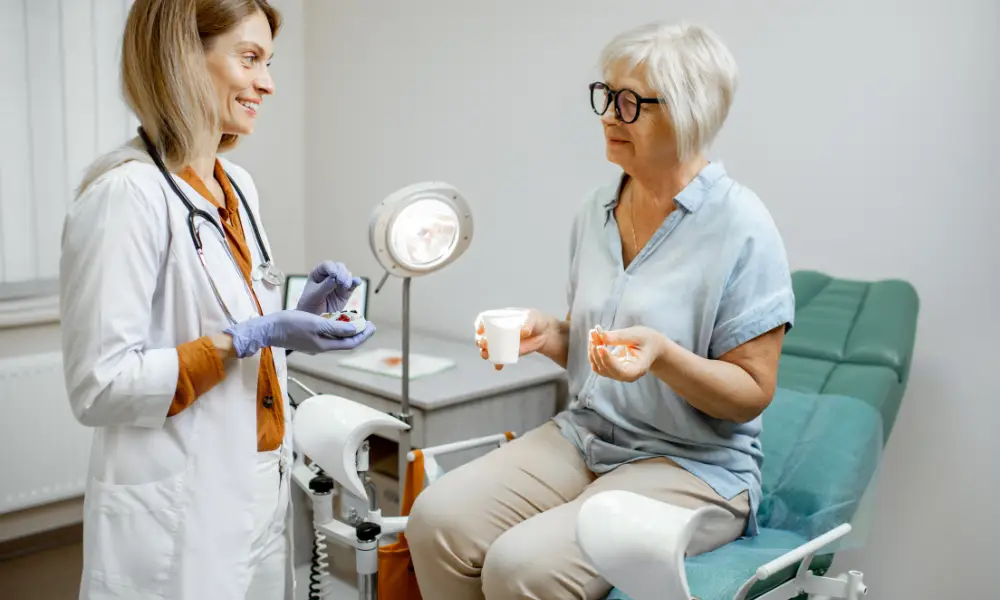Navigating the world of menopause can be challenging for many women. As the body undergoes significant hormonal changes, it often brings a slew of uncomfortable symptoms. In this article, we’ll explore various aspects of menopause medication, from traditional approaches to emerging trends, providing insights to help women make informed choices for their well-being.
Contents
Why Is Menopause Medication Needed? 
Menopause is a natural biological process that occurs in women typically in their late 40s or early 50s, marking the end of reproductive years. During this transition, the ovaries gradually decrease their production of estrogen and progesterone hormones, leading to various physical and hormonal changes. Menopause can cause a range of symptoms that vary in intensity and duration among women.
Therefore menopause medication is needed for the management and treatment of the following common yet major symptoms:
- Hot flashes and night sweats: Sudden and intense feelings of heat, often accompanied by sweating, can disrupt sleep and daily activities.
- Vaginal dryness: Reduced estrogen levels can result in a lack of lubrication, causing discomfort or pain during intercourse.
- Mood swings: Hormonal fluctuations may contribute to changes in mood, leading to irritability, anxiety, or depression in some women.
- Sleep disturbances: Menopausal women may experience difficulty falling asleep or staying asleep, leading to fatigue and daytime sleepiness.
- Bone density loss: Estrogen plays a role in maintaining bone density. Reduced estrogen levels during menopause can contribute to an increased risk of osteoporosis and fractures.
- Changes in metabolism: Menopause can be associated with weight gain and changes in body composition.
To alleviate these symptoms and improve the quality of life for women going through menopause, healthcare providers may recommend menopause medications. These medications often include hormone replacement therapy (HRT), which involves the administration of estrogen, sometimes with progesterone, to help balance hormone levels. HRT can effectively manage symptoms like hot flashes, vaginal dryness, and mood swings.
It’s important to note that while menopause medications can provide relief, they also come with potential risks and side effects. Women considering menopause medication should discuss the potential benefits and risks with their healthcare provider to make informed decisions based on their health profiles and preferences.
What Are Some Medications and Therapies For Menopause? 
Several medications are commonly prescribed to manage the symptoms of menopause. It’s important to note that the choice of medication depends on individual health factors and the specific symptoms experienced. Here are some commonly prescribed medications for menopause:
- Hormone Replacement Therapy (HRT)
- Estrogen Therapy: This can be prescribed alone for women who have undergone a hysterectomy. Common forms include pills, patches, gels, or creams.
- Estrogen and Progestin Therapy: Progestin is often added to estrogen therapy to reduce the risk of endometrial cancer in women who still have a uterus.
- Selective Estrogen Receptor Modulators (SERMs)
- Raloxifene: Often used to prevent and treat osteoporosis, raloxifene acts as an estrogen agonist in some tissues (e.g., bones) and an antagonist in others (e.g., breasts and uterus).
- Antidepressants
- SSRIs (Selective Serotonin Reuptake Inhibitors): Medications like venlafaxine and paroxetine may be prescribed to help manage hot flashes and mood swings.
- Gabapentin and Pregabalin
- These medications, typically used for nerve-related pain, may also help alleviate hot flashes.
- Clonidine
- Originally used to treat high blood pressure, clonidine can help reduce hot flashes in some women.
- Vaginal Estrogen
- For women experiencing vaginal dryness and discomfort during intercourse, topical estrogen creams, rings, or tablets can be applied locally to relieve symptoms.
- Bioidentical Hormones
- Compounded or bioidentical hormones are customized hormone preparations. While they are sometimes used, their safety and efficacy are a subject of ongoing research and debate.
Women must consult with their healthcare providers before starting any menopause medication. The decision should be based on a thorough evaluation of individual health, symptoms, and potential risks. Regular follow-ups with a healthcare professional are also important to monitor the ongoing effectiveness and safety of any prescribed medications.
Benefits Of Choosing Menopause Medicine
Choosing menopause medicine, such as hormone replacement therapy (HRT) or other prescribed medications, can offer several benefits for women experiencing symptoms associated with menopause. It’s important to note that the decision to use menopause medicine should be made in consultation with a healthcare provider, weighing the potential benefits against the individual’s health history and potential risks. Here are some potential benefits of choosing menopause medicine:
- Relief from Hot Flashes and Night Sweats
HRT, in particular, is known to be effective in reducing the frequency and intensity of hot flashes and night sweats, providing relief from these often bothersome symptoms.
- Improved Vaginal Health
Hormone therapies, including local estrogen treatments, can help alleviate vaginal dryness, itching, and discomfort, improving overall vaginal health and sexual satisfaction.
- Enhanced Mood and Emotional Well-being
Hormone fluctuations during menopause can contribute to mood swings, anxiety, and irritability. Some menopause medications, including certain antidepressants, may help stabilize mood and improve emotional well-being.
- Better Sleep Quality
Addressing hormonal imbalances with medication may help improve sleep patterns, reducing insomnia or other sleep disturbances associated with menopause.
- Maintenance of Bone Health
Estrogen plays a crucial role in maintaining bone density. HRT can help reduce the risk of osteoporosis and fractures by preserving bone mass.
- Decreased Risk of Urogenital Atrophy
Hormone therapies can prevent or manage urogenital atrophy, a condition characterized by thinning and drying of the tissues in the urinary and genital areas, which can lead to discomfort and increased susceptibility to infections.
- Cardiovascular Health
Some studies suggest that hormone replacement therapy may have a positive impact on cardiovascular health, including a potential decrease in the risk of heart disease.
- Management of Cognitive Symptoms
Hormonal fluctuations during menopause have shown an association with cognitive changes. Some research suggests that hormone therapy may have a protective effect on cognitive function.





